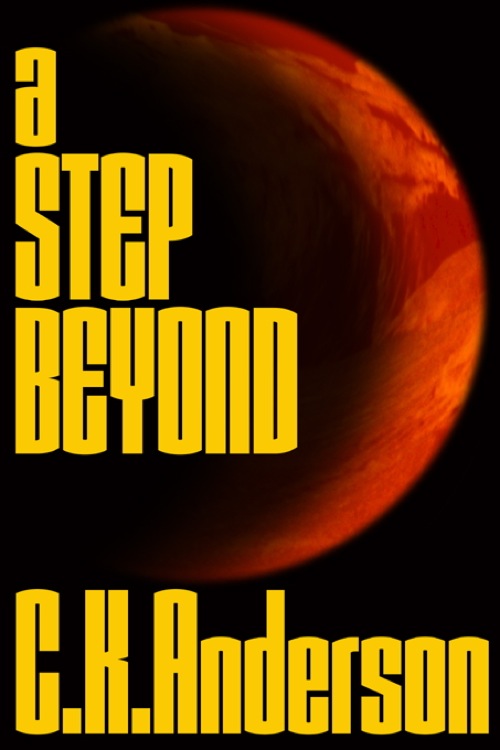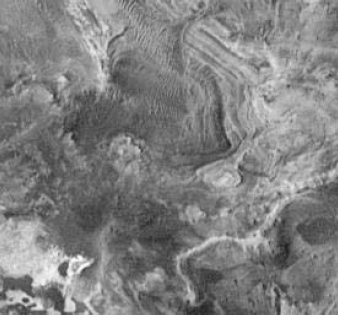A Step Beyond


A STEP BEYOND. Copyright © 2001 by C. K. Anderson. All rights reserved. No part of this book may be reproduced in any form or by any electronic or mechanical means, including information storage and retrieval systems, without permission in writing from the publisher, except by a reviewer who may quote brief passages in a review.
For information address iPublish.com, Hachette Book Group, 237 Park Avenue, New York, NY 10017
An AOL Time Warner Company
The “iPublish.com” name and logo are trademarks of Hachette Book Group, Inc.
ISBN: 978-0-7595-2618-1
First ebook Edition: October 2001
Visit our Web site at
www.HachetteBookGroup.com
Contents
I
am deeply indebted to George Herbert, Frank Crary, Ralph Lorenz, David Knapp, John Childers, David Palmer, Filip De Vos, and Frank Scrooby for their technical advice. Any errors that the reader may encounter are entirely mine. I’m also indebted to family members and friends for their careful reading and much-appreciated comments. To Paul Witcover, my editor and good friend, for his tireless efforts and invaluable advice. And to Cynthia, my wife, for her support, strength, love, and tolerance.

Photo courtesy of NASA
Olympus Mons, at 24 kilometers high and 600 kilometers in diameter, the largest volcano in the Solar System: site of the American landing.

Photo courtesy of NASA
Candor Chasma, part of the Valles Marineris canyon system, which spans over 3000 kilometers of the Martian surface: site of the Russian landing.
Earth is the cradle of mankind, but one cannot live in the cradle forever.
K
ONSTANTIN
T
SIOLKOVSKY
M
ission commander Colonel Alexander Titov, strapped loosely to the ceiling, hung suspended inside the billowing fabric of his sleep restraint. Beneath him was a small desk, upon which he had taped a picture of his wife and two children. A faint glow from the computer display provided just enough light for him to see the pale blue sky of Kazakhstan and a silhouette of his family standing hand in hand upon its arid steppes. His gaze remained fixed upon the picture as he reached behind his head to adjust the volume of the communications channel. Cosmonaut Sergei Demin was transmitting the daily report. He could be heard sipping his coffee while he paused every few minutes to review the material he was about to read.
The silhouettes of Titov’s children were half the size of his wife, and they were waving at him. His youngest child was only two years old. She would be four when he returned from Mars. The thought pained him, but he told himself—as he had countless times before—that the mission was too important to have passed up. His son had just learned how to ride a bike. He was about to turn five and wanted to be a cosmonaut, just like his father. Although Titov spoke with his family almost every night, the eleven-minute delay made it impossible to interact with them.
A rattling snore came from the adjacent compartment, where research engineer Boris Gorbatko was sound asleep. Commander Titov considered banging on the wall, but he knew from experience that it would do no good. Gorbatko would only stop until he fell back asleep, which never took more than a few minutes.
The habitat module contained six personal compartments identical in size and layout to Titov’s, five of which were occupied. It was in the tight confines of these compartments that the cosmonauts enjoyed their only privacy. The module was located at the rear of the spacecraft. Above the hallway that separated the compartments hung the galley. There was no table or chairs, only an oven, a water dispenser, and several drawers of prepackaged food. At the back of the module was the personal-hygiene facility. At the other end was a portal. It was secured. Beyond it lay the health and science module. Through a view panel in the upper quadrant of the portal, assorted equipment could be seen protruding from the walls. At the far end another portal, also secured, led to the flight deck, the foremost cabin of the ship.
At 3:43
A.M.
Moscow time a meteoroid less than one inch in diameter, traveling at a speed of thirteen miles per second, pierced the hull of the flight deck and struck a liquid-oxygen tank. The tank exploded.
The blast ripped through the side of the hull and into the flight deck. Cosmonaut Demin had just finished his third cup of coffee and was reaching for his laptop, which was somersaulting at arm’s length from his nose, when he saw the flash. The explosion picked his body up and slammed it against the portal. His head struck the metallic rim of the view panel. He died instantly.
The environmental-control sensors detected a drop in the oxygen level and opened the valve controlling the remaining tank several nanoseconds before the heat and smoke detectors alerted the main processor to the presence of fire. Before instructions to shut down the oxygen supply could arrive, a stream of pure oxygen had entered the cabin. Fueled by the fresh supply of gas, the fire raced voraciously toward the source. There was a second explosion. A swirling fireball engulfed the flight deck. The flight-control panel burst apart, sending shrapnel into the surrounding walls and Demin’s dead body. A closed-circuit monitor and two computer screens exploded. The circuitry for the main processor melted under the intense heat. A chair went up in flames. Wires stretched out from the naked consoles and shot sparks as they collided. Another chair caught fire. The entire compartment was in flames, then suddenly the fire was drawn by the vacuum through the rupture in the side of the hull. The room went dark.
The trajectory of the
Volnost
was altered by the explosion, causing it to veer away from the unmanned supply ship. Both ships had been in space for six months. The date was October 11, 2017, and the Russians were attempting the first manned trip to Mars. They were better than halfway to their destination.
Commander Alexander Titov rose to his elbows at the sound of the first explosion. As he twisted his head to check the monitors above him, he was thrown suddenly against the compartment walls, bashing his head and nearly breaking his nose. A rush of adrenaline drowned the pain. The general alarm sounded.
Dazed, Titov checked the monitors, where the messages FLIGHT DECK—O PRESSURE and FLIGHT DECK—FIRE were flashing red. He coughed to clear his throat as he extracted himself from his sleep restraint. Before releasing the safety latch of his compartment, he verified that the pressure in the habitat module was one hundred kilopascals, standard sea level. It appeared that only the flight deck had been affected.
Colonel Titov was the first to emerge into the open space of the habitat module. The yellow lights of the emergency system cast ghostly shadows about the room. Pushing with his legs, he propelled himself toward the control panel, where he switched to the emergency oxygen supply and strapped a portable oxygen mask to his head. Just then, Mikhail Chertok, the ship’s pilot, sprang half-dressed from his compartment. “What the hell’s going on?”
Titov pointed toward the oxygen masks, then flipped the switch to the electrical backup system. The shadows faded as white light filled the cabin.
Chertok watched as his commander threw several more switches. He was activating emergency backup systems that had not come automatically on-line. The computer monitor blinked brightly. Within seconds, the local processor had booted and prompted for instructions. Titov attempted to access the main processor but failed as the message SYSTEM UNAVAILABLE flashed on the screen.
“Check the portal,” directed Titov, his eyes fixed on the monitor while he tapped at the keyboard.
As Chertok pushed his way toward the portal, the other three cosmonauts tumbled from their sleeping compartments, disheveled and confused. Squinting from the sudden change in light, the cosmonauts surveyed their surroundings. They were relieved to find the cabin intact, but they were still fearful. Titov turned to address them.
The sight of the oxygen mask, attached like a spidery creature to Titov’s face, heightened their fears. The commander motioned for the others to don their masks.
“There has been an explosion on the flight deck,” began Titov. “The extent of the damage is unknown. I am unable to access the primary computer. The emergency warning system indicates there is a fire in the forward cabin, and the pressure is zero kp’s. I cannot verify this.” He pointed at the console behind him. “Boris, I want the main processor back on-line.”
“Commander,” Mikhail Chertok said as he peered through the portal, “the laboratory does not appear to be damaged. I can’t see beyond the second portal—everything is dark. I should be able to see some light.”
“Not necessarily,” Titov replied. “The emergency lights may be too dim to see from here.”
Chertok and the others knew this to be false, but said nothing. It was unlike Titov to be less than truthful. A terrible silence followed as they slowly realized that something else was wrong.
“Where is Sergei?” Boris Gorbatko asked finally.
Surprised, they all looked around to verify that Sergei was indeed not with them. All except for Colonel Titov, who stood perfectly still as he observed and noted each reaction.
“He was on the flight deck,” said Titov, when their gazes eventually returned to him.
E
leven minutes after the explosion, Cosmonaut Sergei Demin disappeared from the screen that dominated the front wall of the Russian Space Agency’s control room. The sudden shift in brightness was enough to divert Yuri Tretyak’s attention from the environmental data on his monitor. FLIGHT DECK—0 PRESSURE flashed across the main screen. Moments later an alarm sounded as the second message FLIGHT DECK— FIRE appeared. Tretyak did not immediately grasp the meaning of the messages. He stood up. His throat went dry, and he was unable to swallow. He looked down at the controls on his panel and keyed in the instructions to bring up the flight deck transmission. Nothing happened. He read the messages again, and as he read, it occurred to him that perhaps Demin was dead. He had been on the flight deck. It occurred to Tretyak that the others might also be dead. He was growing frightened. The main screen went blank. Several of the smaller screens were flashing red.
A numbness enveloped his body as he realized they had lost contact with the
Volnost.
He looked to his colleagues for an explanation. They had risen to their feet and were staring dumbfounded at the blank screen. It was the rising pitch of the alarm that finally startled Tretyak into action.
“Oleg, try to contact the cosmonauts,” he said to the communications engineer. “I must call Schebalin.”